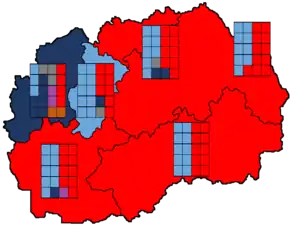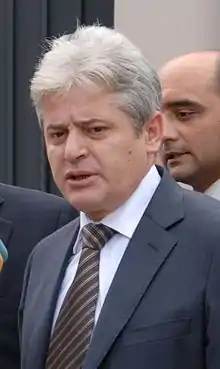2016 Macedonian parliamentary election
Early parliamentary elections were held in Macedonia on 11 December 2016, having originally been planned for 24 April and later 5 June.[1] The Electoral Commission called a re-run for 25 December 2016 in Tearce and Gostivar,[2] though in Gostivar it was called off after the VMRO-DPMNE filed a lawsuit against the decision,[3] and in Tearce the outcome was unchanged.[4]
| |||||||||||||||||||||||||||||||||||||||||||||||||||||||||||
All 120 seats to the Sobranie 61 seats needed for a majority | |||||||||||||||||||||||||||||||||||||||||||||||||||||||||||
|---|---|---|---|---|---|---|---|---|---|---|---|---|---|---|---|---|---|---|---|---|---|---|---|---|---|---|---|---|---|---|---|---|---|---|---|---|---|---|---|---|---|---|---|---|---|---|---|---|---|---|---|---|---|---|---|---|---|---|---|
| |||||||||||||||||||||||||||||||||||||||||||||||||||||||||||
 Results by constituencies and mandates allocated in each VMRO-DPMNE SDSM DUI BESA Alliance for Albanians DPA | |||||||||||||||||||||||||||||||||||||||||||||||||||||||||||
| |||||||||||||||||||||||||||||||||||||||||||||||||||||||||||
 |
|---|
|
|
Although VMRO-DPMNE attempted to form a coalition with BDI, coalition talks broke down in late January 2017.[5] After that, the SDSM pursued informal coalition talks with the BDI, though as of late February 2017, coalition talks were frozen on the usage of the Albanian language.[6]
Background
The elections were called as part of an agreement brokered by the European Union to end the protests against the government of Nikola Gruevski.[7] The demonstrations were sparked by the wiretapping scandal involving high ranking politicians and security personnel.[8] From 20 October 2015, a transitional government was installed including the two main parties, VMRO-DPMNE and the Social Democratic Union (SDSM). A new special prosecutor was appointed to investigate Prime Minister Nikola Gruevski and government ministers. According to the Pržino Agreement signed in mid-December 2015, Gruevski was required to resign as Prime Minister 120 days before the elections. Assembly speaker Trajko Veljanovski confirmed the date on 18 October.
Electoral system
Of the 123 seats in the Assembly of the Republic, 120 are elected from six 20-seat constituencies in Macedonia using closed list proportional representation, with seats allocated using the d'Hondt method. The remaining three members are elected by Macedonians living abroad.[9][10] However, the overseas seats would only be validated if the candidates won enough votes. As they did not, the seats were not awarded.
Results
| Party | Votes | % | Seats | +/– | |
|---|---|---|---|---|---|
| VMRO-DPMNE coalition | 454,577 | 39.39 | 51 | −10 | |
| Social Democratic Union coalition | 436,981 | 37.87 | 49 | +15 | |
| Democratic Union for Integration | 86,796 | 7.52 | 10 | −9 | |
| Besa Movement | 57,868 | 5.01 | 5 | New | |
| Alliance for Albanians | 35,121 | 3.04 | 3 | New | |
| Democratic Party of Albanians | 30,964 | 2.68 | 2 | −5 | |
| "VMRO for Macedonia" coalition | 24,524 | 2.13 | 0 | 0 | |
| The Left | 12,120 | 1.05 | 0 | New | |
| "CCJ–Third Block" coalition | 10,028 | 0.87 | 0 | New | |
| Liberal Party | 3,840 | 0.33 | 0 | 0 | |
| Party for Democratic Prosperity | 1,143 | 0.10 | 0 | 0 | |
| Total | 1,153,962 | 100.00 | 120 | −3 | |
| Valid votes | 1,153,962 | 96.82 | |||
| Invalid/blank votes | 37,870 | 3.18 | |||
| Total votes | 1,191,832 | 100.00 | |||
| Registered voters/turnout | 1,784,416 | 66.79 | |||
| Source: SEC | |||||
References
- Statement by Commissioner Hahn and MEPs Vajgl, Howitt and Kukan: Agreement in Skopje to overcome political crisis European Commission, 15 July 2015
- "Macedonia: With Revote at Polling Station on Sunday, Distribution of Mandates Depends on Vote Count Independent.mk, 21 December 2016". Archived from the original on 27 December 2016. Retrieved 21 December 2016.
- "VMRO-DPMNE's Lawsuit Accepted, There is No Re-Run in Gostivar!". CIVIL. 21 December 2016. (in Macedonian)
- "CIVIL's Preliminary Report on Election Rerun in Tearce". CIVIL. 26 December 2016.
- "Macedonia's political crisis continues as conservatives fail to form coalition". Deutsche Welle. AP, dpa, Reuters. 30 January 2017. Retrieved 2 February 2017.
- Sinisa Jakov Marusic (20 February 2017). "Macedonia Govt Talks Stuck Over Albanian Language Demands". Balkan Insight. Retrieved 20 February 2017.
- Macedonia unrest: EU brokers plan for early elections BBC News, 2 June 2015
- Macedonia: Special Prosecutor Wins Standoff Over Wiretap Evidence OCCRP
- "ODIHR Election Observation Mission Final Report". www.osce.org. Retrieved 5 December 2019..
- Electoral system IPU


